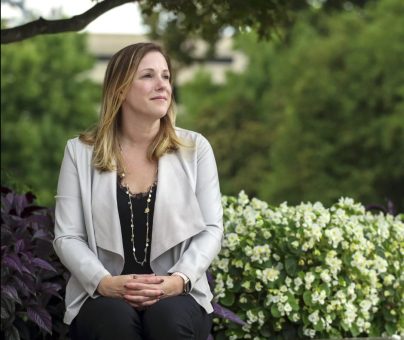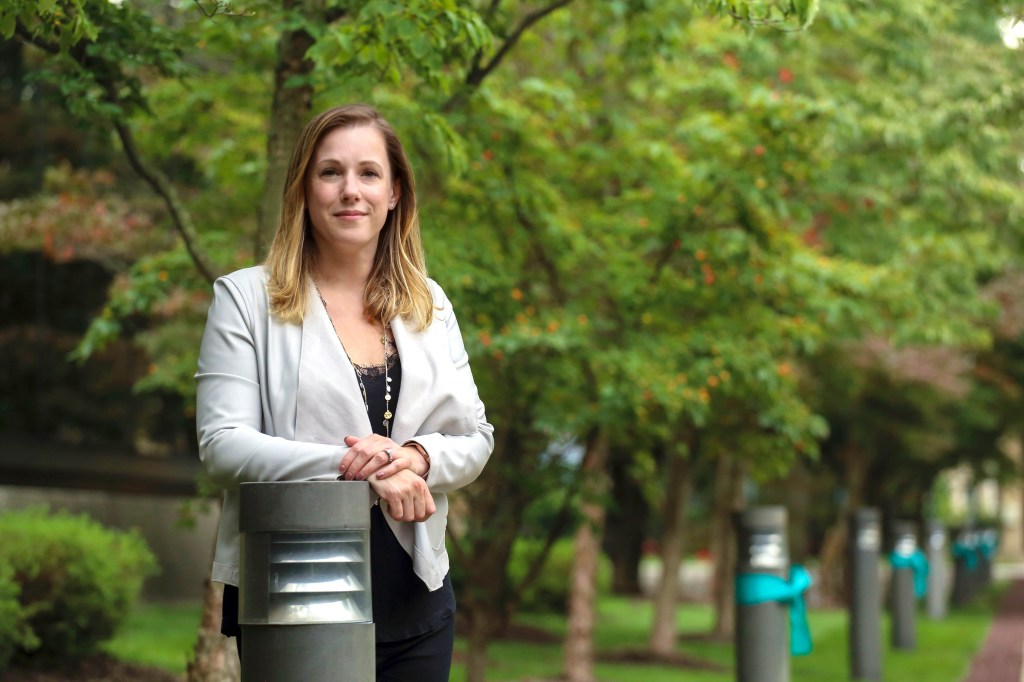Sometimes in health care, work hits especially close to home when we find ourselves facing the same diseases as the families we are striving to help.
For Claire Mulhearn, a former employee, her professional and personal lives suddenly merged when she was diagnosed with triple-negative breast cancer, also known as TNBC.
Claire shares her story with Dr. Gursel Aktan, vice president of clinical research for women’s cancers, who has been an important contributor to Merck’s research in triple-negative breast cancer.
Dr. Aktan:
Can you share your memories of when you first heard the news that you had breast cancer?
Claire:
I remember it vividly. I was at work. I had just finished up a big meeting when I got the call from my doctor. That’s when I heard those words for the first time: invasive ductal carcinoma – breast cancer.
I had to ask the doctor to repeat it five times, so I wouldn’t forget it. I even wrote it on a piece of paper – invasive ductal carcinoma. I still have that piece of paper.
I hung up the phone and immediately walked into my boss’s office and collapsed. She picked me up and just held me while I cried.
Dr. Aktan:
You must have felt as if your life completely changed in that instant.
Claire:
It really did. As the head of oncology communications at the time, I had spent my days talking about how we had the potential to change the lives of people with cancer. Now, I was one of the patients living with cancer.
I didn’t have any history of breast cancer in my family, so this news seemed to come out of nowhere. I was only 37 years old with a husband and two beautiful young children. My daughter was only three and my son was five. Suddenly everything was uncertain – would I be here for their birthdays, would I be able to see them grow up?
And I also didn’t have the full picture yet. All I knew at first was that I had breast cancer. I didn’t know what type, what stage – or how aggressive my cancer might be. Then I learned it was triple-negative breast cancer.
Dr. Aktan:
Earlier in my career when I was caring for patients, there was nothing worse than having to tell a young woman that her breast cancer was triple-negative – which you knew was a more aggressive form of breast cancer. It’s heartbreaking because it tends to strike younger women, like you. How did you and your husband cope with this news?
Claire:
Well, I knew from my line of work that I was facing a really big battle. I also knew I had to be my own best advocate, so I learned as much as I could. I read all the latest research and reached out to everyone I knew who had experience with this disease.
Through it all, my husband was my champion. He tried to help me see the bright side of things as new information came in. We both dug in together and worked with my oncologist, the surgeons and nurses to find a path forward. Now, it’s more than five years later and I feel blessed every day to be living without cancer.
I wish the same for all women facing triple-negative breast cancer, and I want to remain optimistic about the future. Can you explain why triple-negative breast cancer is so challenging – and how your research is trying to meet those challenges?
Dr. Aktan:
Hearing stories like yours, Claire, is what drives me to pursue research for this challenging form of breast cancer. Triple-negative is different from other types of breast cancer because it is usually more aggressive, with early and higher rates of distant recurrences.
We have an extensive clinical development program including a focus on breast cancer, and I am optimistic about the progress we are making in breast cancer research.
Over the course of my career, I’ve been touched by so many women bravely battling triple-negative breast cancer, and it’s inspiring to see how well you are doing today. Looking back on your experience, what do you want people to take away from what you’ve learned?
Claire:
A quote that I have lived by since day one of my journey is:
“Life isn’t about waiting for the storm to pass.
It’s about learning to dance in the rain.”
Hearing the words “you have cancer” is something that no one wants to ever hear. It’s awful. It’s unfair. You will face anxiety, anger, depression, fear. You can let those negative emotions take over…or not. I chose not to. It wasn’t easy to do every day in the beginning or even now. But, through it all, I’ve tried to stay positive – it was one thing I could control.

“Today I can say that I have battled breast cancer, but my focus continues to be living life to the fullest – not only for myself but, importantly, for my family.”
Claire Mulhearn
To everyone at Merck, especially those of us working in cancer, Claire’s story is a powerful motivation to keep following the science. It is stories like hers that inspire Dr. Aktan and her team to propel the research forward with a goal of helping as many women as possible who are fighting their own battles with triple-negative breast cancer.
© 2022 Merck & Co., Inc., Rahway, NJ, USA and its affiliates. All rights reserved.
CA-NON-02273
